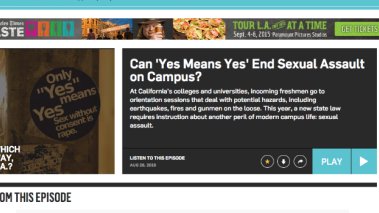Table of Contents
FIRE’s Samantha Harris on L.A.’s KCRW: ‘Yes Means Yes’ Policies Endanger Due Process

FIRE Director of Policy Research Samantha Harris joined a panel discussion on yesterday’s edition of KCRW’s Which Way, L.A.?, focusing on the question, “Can ‘Yes Means Yes’ End Sexual Assault on Campus?”
FIRE has been concerned about the ramifications of “yes means yes” or “affirmative consent” policies for some time. Affirmative consent policies effectively shift the burden of proof for a criminal offense onto the accused, forcing them to prove their innocence. It’s no surprise that FIRE would be concerned about this poorly thought-out abandonment of “innocent until proven guilty.”
Sam was joined in the discussion by Jodie Tillman, a reporter for The Orange County Register; Meghan Warner, a University of California, Berkeley senior and member of the UC Task Force on Preventing and Responding to Sexual Violence and Sexual Assault; and Mandy Mount, psychologist and director of the UC Irvine Campus Assault Resources and Education (CARE) office.
Sam agreed with the other panelists that sexual assault was a serious problem on campus—and one that colleges are failing to adequately address. But she noted that the schools are equally bad at affording accused students due process:
Campuses are bad at handling these cases and it is not mutually exclusive to say that campuses are mishandling them in ways that hurt victims and in ways that hurt accused students.
Sam said that she had “no doubt” that colleges and universities mishandled sexual assault cases in ways that are unfair to victims, but that shifting the burden of proof to the accused is equally unfair:
[I]n order to prove him or herself innocent, the accused person has to come forward with evidence of consent in a situation in which there’s very unlikely to be tangible evidence of that nature. The difficulty of this is demonstrated by a comment one of the bill’s co-authors herself made to a California newspaper. She was asked by a paper how an innocent student could demonstrate that he or she received affirmative consent, and her response was, “Your guess is as good as mine.”
Sam noted that discussions of how to curb sexual assault on campuses “are conversations that need to be happening about respect and about consent.” But she made clear that “when you’re talking about using [‘yes means yes’] as a standard in what is a quasi-legal judicial proceeding, it’s simply unworkable.”
You can listen to the full conversation on KCRW’s website.
Recent Articles
FIRE’s award-winning Newsdesk covers the free speech news you need to stay informed.

BREAKING: New Title IX regulations undermine campus free speech and due process rights


Stanford president and provost cheer free expression in open letter to incoming class
